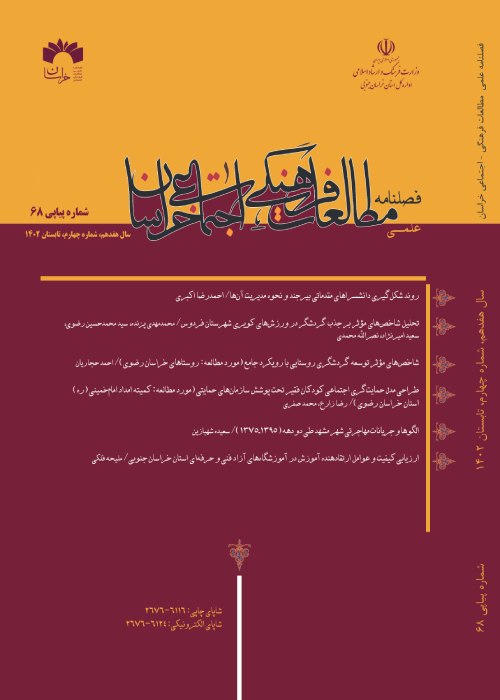A Study on Effective Social Factors on Religious Participation among Students of Birjand University
Author(s):
Abstract:
Religious participation is the most important constituent of social capital and one of the key concepts of religion sociology. In Iran whose majority of population are Muslims and Shiita, religious participation is very desirable and worthwhile and Quranic verses emphasize it too. But despite Islamic orders, research and public sentiment indicate that religious participation of Iranian people has reduced in recent decades in contrary to early years of Iran Revolution, and this can be seen more in young people than other parts of society. This question arises in the mind of the investigator: why, despite the fact that our youth become familiar with religious participation from childhood and it is considered in educational centers, mass media and family, do they not care about some forms of religious participation, and their adherence to religious participation is not as expected? Therefore, the aim of this study is to investigate the social factors influencing religious participation of the youth, especially students of Birjand University. The method of research is quantitative and the instrument of data collection is a researcher-developed questionnaire. Statistical population of this study consist of the students of Birjand University in the academic year of 94-95. This population includes 9564 people from which a sample of 312 people, according to Cochran formula and using a proportionate stratified random sampling, was selected. The proposed relationships between variables were examined by using the analytical methods of correlation coefficient of Spearman, Chi- square, Multiple regression )Enter method( and path analysis. The results show that the dependent variable, which is religious participation, has a significant relationship with religious values variable, using the mass media variable, social-economic status of the family variable, social trust variable and type of school variable. Also, the multivariate analysis shows that the variables of religious values, social trust, socialeconomic status of the family and using the mass media have the greatest effect on the dependent variable. The results of this study are similar to the views of Inglehart, Norris and Putnam.
Keywords:
Language:
Persian
Published:
Scientific Quarterly of Social-Cultural Studies of Khorasan, Volume:10 Issue: 4, 2016
Page:
7
magiran.com/p1609046
دانلود و مطالعه متن این مقاله با یکی از روشهای زیر امکان پذیر است:
اشتراک شخصی
با عضویت و پرداخت آنلاین حق اشتراک یکساله به مبلغ 1,390,000ريال میتوانید 70 عنوان مطلب دانلود کنید!
اشتراک سازمانی
به کتابخانه دانشگاه یا محل کار خود پیشنهاد کنید تا اشتراک سازمانی این پایگاه را برای دسترسی نامحدود همه کاربران به متن مطالب تهیه نمایند!
توجه!
- حق عضویت دریافتی صرف حمایت از نشریات عضو و نگهداری، تکمیل و توسعه مگیران میشود.
- پرداخت حق اشتراک و دانلود مقالات اجازه بازنشر آن در سایر رسانههای چاپی و دیجیتال را به کاربر نمیدهد.
دسترسی سراسری کاربران دانشگاه پیام نور!
اعضای هیئت علمی و دانشجویان دانشگاه پیام نور در سراسر کشور، در صورت ثبت نام با ایمیل دانشگاهی، تا پایان فروردین ماه 1403 به مقالات سایت دسترسی خواهند داشت!
In order to view content subscription is required
Personal subscription
Subscribe magiran.com for 70 € euros via PayPal and download 70 articles during a year.
Organization subscription
Please contact us to subscribe your university or library for unlimited access!



